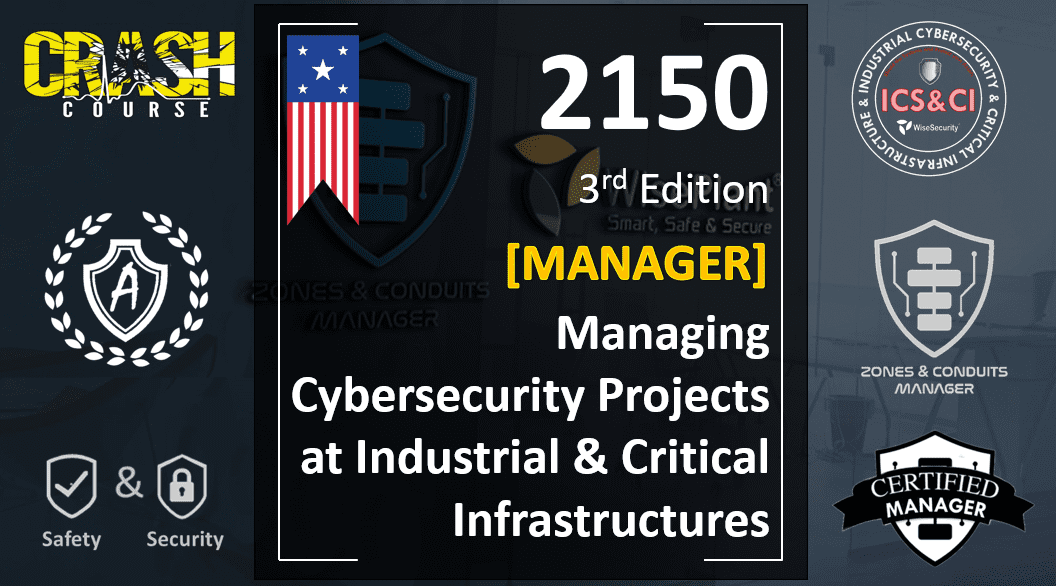Recommend or Share:
The ability of any organization (end user or supplier) to develop and implement industrial cybersecurity management projects successfully, making optimal use of resources, in a minimum time, with a clear visualization of progress, is no longer an option.
The WBS methodology, explained in course 2150, to develop and implement industrial cybersecurity guarantees success. The modular approach of the methodology, with the clarity it provides, make it easy, reliable, profitable, safe, predictable and visible to all.
At the end of the 2150 training course you will be able to:
- Understand each of the activities that are necessary to develop to implement a mature industrial cybersecurity program, complying with international standards by industry consensus and other national regulations.
- Understand the requirements and minimum inputs necessary to start each of the activities properly, the necessary resources and a credible time estimate.
- Understand the objectives and deliverables that are necessary to produce as results of the different activities and the corresponding reports as demonstrative and evidence of such implementation.
- How to demonstrate compliance with the ISA/IEC-62443-X-X series of standards (and other regulations). Important for the organization that wants to certify the CSMP system.
- Formalize and document the completion of each of the main activities of the CSMP program. Observe and analyze the results of everything that is being done.
- Certify the progress of progress in a modular way. It can be used by a Project Manager (PM) to monitor progress appropriately in multiple plants and processes at the same time.
- Generate the necessary evidence that the organization is complying with the implementation of a mature and complete Industrial Cybersecurity program.
- Facilitate good decisions to mitigate the risks of Industrial Cyber to protect the most valuable assets and create an industrial infrastructure resistant to all types of threats.
- Produce and document the necessary elements to justify industrial cybersecurity investments adequately with the certainty that security risks are mitigated.
You will cover the following topics in the course:
- Development of minimum policies and procedures necessary for the industrial cybersecurity program, CSMP.
- Development of necessary competencies, training programs and awareness of the entire organization.
- Audit, compliance and continuous improvement.
- Life Cycle Phase:
- Industrial Cybersecurity risk assessment and decision-making for intolerable risk mitigation.
- Design and implementation of security to protect all industrial assets and potential recipients of risks.
- Operation and maintenance to maintain the minimum necessary security tolerable by the organization.
- Development and classification of suppliers for Industrial Safety.
- Process of engineering, design, purchasing, construction, testing, and validation of safety in new systems.
- Implementation strategy and essential recommendations that will save the company more than 50% in implementation effort and resources.
Who is it for?
- Recommended for all personnel in industrial sectors such as: energy, water, oil, gas, steel, food, pharmaceutical, and many others, which are related to the activities of protection of critical infrastructure and control systems.
- The participation of IT security managers, system integrators, suppliers of industrial control systems, plant engineers, production management and plant operation, industrial safety, specialists in safety instrumented systems and maintenance personnel is recommended; whether they are high or middle management.
Requirements:
It has no specific requirements. It is recommended that the professional has knowledge of some of the following:
- Project Management according to PI/PMBOK methodology.
- International Cybersecurity Standards by industry consensus, ISA/IEC-62443.
- ISO-27000 Corporate Cybersecurity or Information Security Standards.
- Industrial risk management standards such as ISA/IEC-61511, functional safety.
- National regulations and/or standards such as NIST, NERC, and others.
- Experience in corporate project management and cultural change management.
- Other industrial risk management standards (worker safety, environmental safety, etc.).
Deliverables:
Participants will receive through the educational platform the material in digital form, including the following materials.
- Access to course lessons online.
- Various documents, videos, and supplementary material for participants to deepen.
- Access to the Educational Campus to download supplementary information and software.
Certificates:
A first certificate of knowledge is issued upon completion of the course
- Certificate: “Industrial Cybersecurity and Critical Infrastructure Life Cycle Management Intern”
- CRE credits: 0.8
- The certification exam is taken in class at the end of the course. Available in Spanish, Portuguese, and English.
A second certificate of experience is issued after practical implementation in real projects.
- Certificate: “Expert in Life Cycle Management of Industrial Cybersecurity and Critical Infrastructures”
- CRE credits: cumulative, depending on the duration of the activities carried out by the practitioner.
- The certificate is issued after a demonstration of practical experience with the active participation of the practitioner in real projects making use of the methodology.
Recognitions:
All participants who meet the course requirements and successfully pass the final exam with a good grade will be awarded a Digital Badge. The Digital Badge certifies that the participant has attended the 2150 training course and has executed the final evaluation test with a good grade, verifying that said participant has assimilated the new knowledge reasonably.
All practitioners who develop and demonstrate active participation in the different activities of the methodology, and who have accumulated a minimum number of hours of attendance in each of the specific activities. They will be eligible to obtain the corresponding certificate of experience. Supervision by a certified project leader is required. Process similar to the hours of an airplane pilot.



